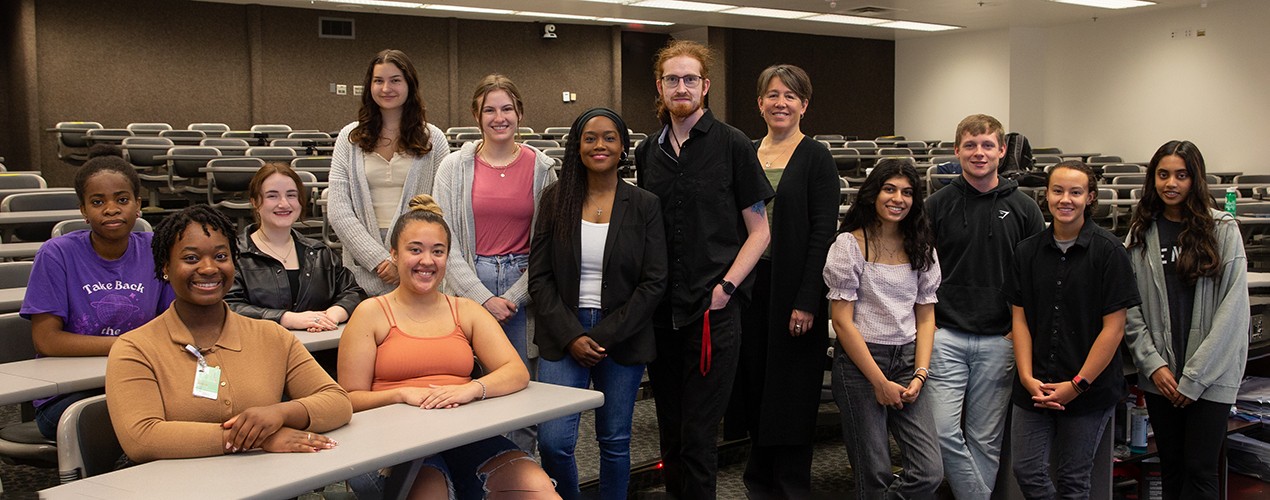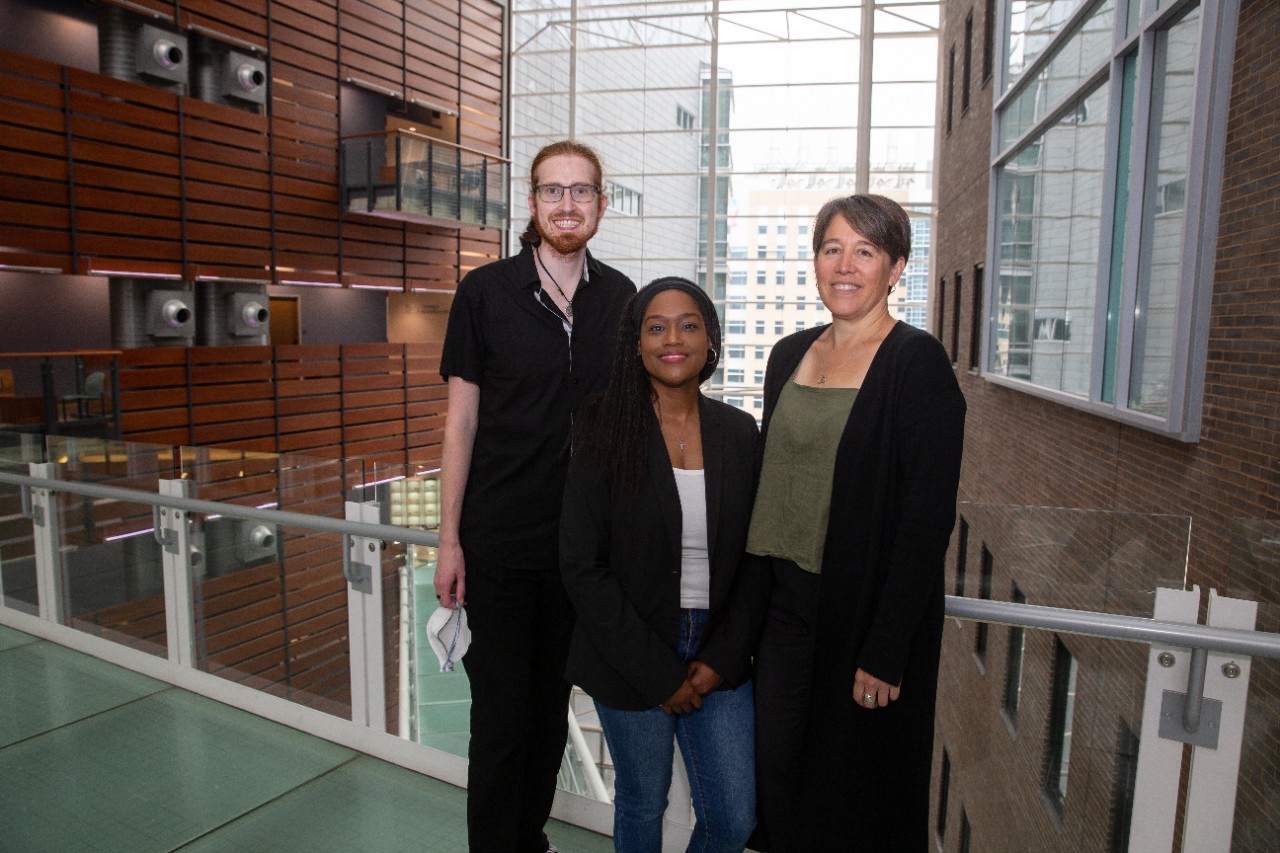
Student scholar follows personal research dream at UC
Research focuses on the type of leukemia he was diagnosed with nine years ago
When Timothy White was diagnosed with acute lymphoblastic leukemia (ALL) at the age of 18, he had no idea that less than a decade later, he would develop a passion for research. Thanks to a summer research program at the University of Cincinnati, he is able to follow that research dream.
White is one of 10 students taking part in a 10-week RISE UP program funded by a grant from the National Institutes for Health (NIH). Its goal is bringing in students who are underrepresented in the sciences for a variety of reasons, like underrepresented minority, disadvantaged or disabled students or those with a certain socioeconomic status.
“RISE UP stands for Research Innovations in NeuroScience Education for Underserved Populations,” says Teresa Reyes, PhD, professor in the Department of Pharmacology and Systems Physiology at the UC College of Medicine, who runs the program along with Matia Solomon, PhD, an associate professor in the Department of Psychology in the UC College of Arts and Sciences.
“The students are matched with a lab mentor before they arrive in Cincinnati, so for the entirety of the 10-week program, they are working full time doing research in the lab. We also have weekly meetings where they are exposed to other neuroscience research at UC, and we have professional development workshops such as how to apply to graduate school.”
The graduate school application assistance is one of the features of the program that piqued White’s interest. He was diagnosed with ALL shortly after finishing high school in Littleton, Colorado, and initially, he planned to fulfill his desire to help children with mental health issues by training to be a child life specialist, which are pediatric health care professionals who work with children and families in hospitals and other settings to help them cope with the challenges of hospitalization, illness and disability.

Timothy White, left, Matia Solomon, PhD and Teresa Reyes, PhD/Photo/Andrew Higley/UC Marketing + Brand
“If you’ve ever spent a lot of time in a children’s hospital, you probably know that a child life specialist is a mix between a social worker and a pediatric psychologist,” White says. “Their entire job is to support kids while they are stuck in a hospital and make sure that their social, intellectual and any kind of needs are met, giving them somebody to hang out with or someone to talk to.”
He got an associate degree in psychology at Arapahoe Community College and, after a break in his studies during the early days of COVID-19, he started working towards his bachelor’s degree at the University of Colorado Denver (CU). That’s when one class changed the course of his studies.
“One of the first classes you take is Biological Basis for Behavior, which is the intro to neuroscience class at CU,” says White. “Up until that point, I had avoided hard science. I didn’t think I had it in me. I didn’t do a lot of that in high school. I took [the course] and the first day I was like, ‘This is the most amazing thing I’ve ever learned about in my life.’ Within about a year, I had determined that maybe instead of helping kids directly, I could instead work on learning more about leukemia and other childhood illnesses and work on showing a difference and influencing other kids who go through similar experiences.”
White says on a whim he decided to attend the Society for Neuroscience conference in San Diego in November 2022.
“They had an app where you could search all of the abstracts that are going to be presented for the entire conference,” White says. “I searched for leukemia because that’s what I want to do in grad school hopefully and I saw there was going to be a presentation on leukemia. I sent an email to Dr. Reyes asking if we could get together and talked about what she was going to be presenting.”
After the two met for coffee and discussed the research, White went back to Colorado and talked to his adviser about how he was very interested in what was going on at UC and how they were doing the exact research he wanted to do.
“In early spring, I was talking to some of the people at my lab about experience needed for grad school applications because that is a very intimidating thing to approach,” White says. “I asked them how they [did it]. Some of them mentioned summer programs where you can do research as an undergrad in between semesters.
“I did some checking to see if UC had such a program and they did, and registration for it closed that night.”
White says he frantically got his application together, asking some of his professors to quickly write reference letters which they did, and he got accepted. UC professor Reyes says she’s glad White is in the lab, and a good example of who can benefit from the RISE UP program.
I think it’s great that this exists and is available for students, especially because underprivileged people may not have that opportunity to do so otherwise
Timothy White on the RISE UP program
“People like Timothy and all of our scholars are students who for all sorts of reasons have not had an opportunity to work in a research lab,” Reyes says.
“Maybe there are stories like Timothy’s where his education was interrupted because of illness. Other students come from smaller colleges where there aren’t opportunities to participate in biomedical research. And for some students, the idea of going to graduate school is a new one.
“I think demystifying the experience of applying to graduate school paired with the opportunity to get hands-on experience with your own research project is really exciting. I think it opens this horizon where students can see themselves as scientists, and we hope they will then feel empowered and supported to pursue graduate education.”
White says he’s hoping his experience at UC sets him up to realize his dream of researching ALL.
“I thought it was really cool for UC to offer something like this where you get lab experience whether you’re going to grad school or not because it’s important for your education. It’s leaps and bounds better in actually educating you on the subject,” he says.
“Actually sitting down and working in a lab is so different and so much more interesting and engaging. I think it’s great that this exists and is available for students, especially because underprivileged people may not have that opportunity to do so otherwise.”
Lead photo at top of the RISE UP research program group/Andrew Higley/UC Marketing + Brand
Next Lives Here
The University of Cincinnati is classified as a Research 1 institution by the Carnegie Commission and is ranked in the National Science Foundation's Top-35 public research universities. UC's graduate students and faculty investigate problems and innovate solutions with real-world impact. Next Lives Here.
Related Stories
Student scholar follows personal research dream at UC
July 25, 2023
Timothy White, who was diagnosed with acute lymphoblastic leukemia nine years ago, is taking part in a 10-week summer program in the College of Medicine called RISE UP. He is researching the type of cancer he had.
NIH grant gives underrepresented students insight into the neurosciences at UC
August 12, 2021
Spend your summer at UC learning how neuroscience reserach is conducted
Littleton Independent: Littleton’s Timothy White researches cognitive deficits he lives with
August 8, 2023
Timothy White, a visiting scholar from the Denver, CO, area, spent part of his summer in the RISE UP research program at the UC College of Medicine. The Littleton Independent, a community newspaper in the Denver area, published a story about his experience at UC.
